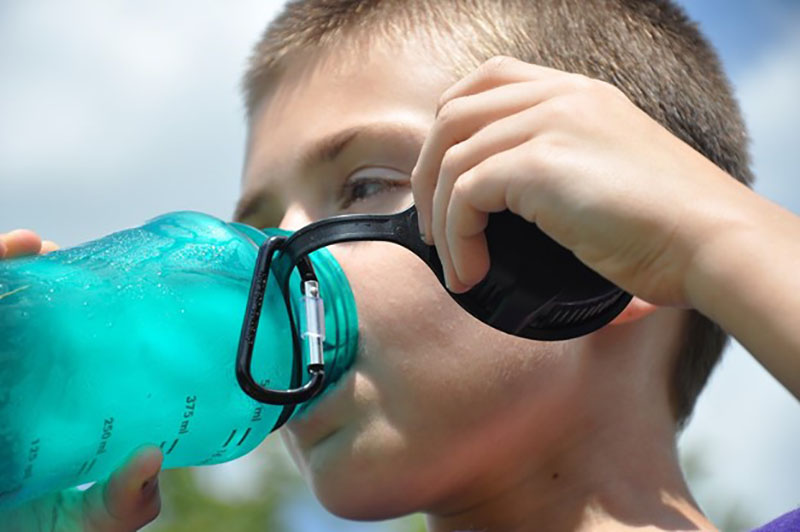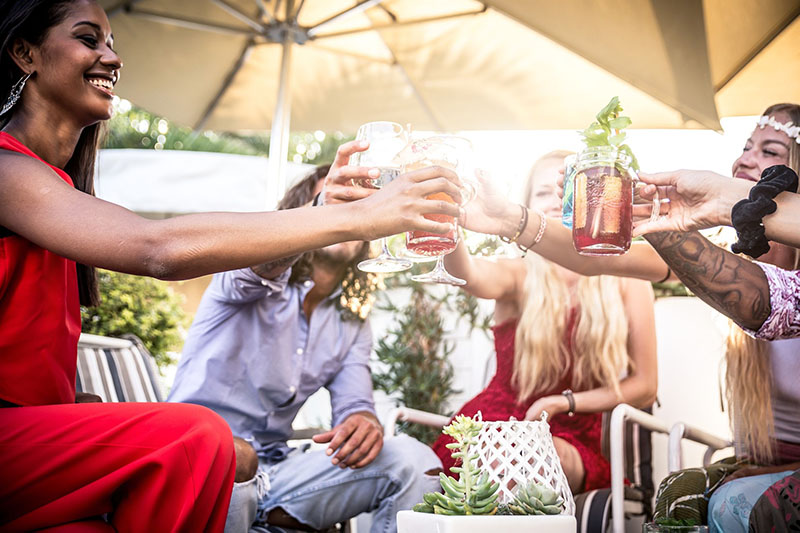- Mon-Fri 9am-4pm EST
- 888-663-4621
Dehydration is a serious condition that comes from losing too much water from your body without replacing it. It can occur in any season and at any age, but it is most common in summer when people are more active and outside. Keeping yourself hydrated can help you avoid fainting, heat exhaustion, and heat stroke, which can be life-threatening conditions. Your body also needs water to maintain its core temperature, keep your skin healthy and flexible, regulate your digestion, be transported around your body in the bloodstream, and allow muscles to move the way they need to. However, these tips will keep your body hydrated during an outdoor event.
It is important to know how much water you need each day to stay hydrated. This is especially true before attending an outdoor event. Dehydration can cause several health problems, so knowing what it looks like and how you can avoid it is key. The goal is to have enough water in your body that you urinate two or three times a day. This will tell you that your body is well-hydrated, even if you don't feel thirsty. By being aware of this and remaining hydrated, you'll enjoy any outdoor event without fear of dehydration.

Suppose you're headed to outdoor activity, whether a barbecue or a camping trip, you'll likely be spending time outside in the sun. Unfortunately, the sun brings heat and ultraviolet (UV) rays, which can cause skin damage and dehydration. So, it's important to drink water before, during, and after any outdoor activity to stay hydrated. This will give your body time to start getting used to the idea that it's going to be drinking more than usual.
Drink water every 30 minutes or so while you're outside because it helps your body adjust and gives it some time to use the water before needing more.
Outdoor events in the summer can be fun, but they can also put a lot of stress on your body. Whether you're watching a concert, playing ultimate frisbee, or just hanging out in the park, your body is being exposed to higher temperatures and more sunlight than normal.
It's important to eat multiple foods with high water content throughout the day if you're participating in a strenuous activity. Foods that contain high amounts of water include fruit (watermelon, oranges, grapes), vegetables (cucumbers, celery), nuts (almonds), beans (soybeans), and popcorn.
Staying hydrated during an outdoor event can be difficult, especially if you aren't eating enough fruits and veggies. The most obvious solution is to replace your sports drinks with water or fruit juice, but this strategy has shortcomings. For example, your body needs more than just carbohydrates to keep going strong during a long workout.
Fruits and veggies contain valuable vitamins, minerals, and antioxidants that help your body fight fatigue and build endurance. They also provide a good source of potassium and other electrolytes, which are essential for maintaining fluid balance in the body. In addition, fruits are typically high in fiber and low in fat, which makes them an ideal food to put in a cooler for when you need a little something to tide you over until the next meal.
All these benefits make fruits perfect for taking on a trip or packing in an insulated lunchbox for those times when you need a healthy snack. Try replacing sports drinks with juices such as orange juice or pineapple juice, or take along some fresh fruit such as grapes or bananas. Don't forget that dried fruits such as raisins and apricots are also great for taking with you on trips because they are lightweight and don't spoil easily.
Going to an outdoor event, and not drinking alcohol seems counterintuitive. If you drink alcohol, you'll need to drink even more water to stay hydrated. Alcohol is diuretic, so it will dehydrate you faster than just plain water would. If you drink too much alcohol without enough water, you might feel fatigued and experience headaches and dizziness.
Wearing lightweight, light-colored clothing will help you stay hydrated during an outdoor event because it allows your sweat to evaporate more easily.
When the air is dry, sweat on your skin evaporates quickly. This cools your body and helps keep it from overheating, leading to dehydration. However, sweat doesn't evaporate as quickly when the air is already full of moisture. So, you're not cooling your body effectively.
If you wear dark clothing and limit yourself to one outfit for a whole day of outdoor activities, that means that your sweat will have less room to evaporate and will stay on your skin instead, which could cause you to overheat and get heatstroke if you're not careful.
Lightweight clothing also helps you stay cool by allowing air to sneak in between the layers of fabric and dissipating your sweat. When this happens, your body stays cooler than it would otherwise be because the lighter the clothing material, such as silk or cotton, the better.
Water is one of the best beverages for staying hydrated at an outdoor event because it helps replace fluids lost through sweating. However, other beverages will also help keep your body properly hydrated during your outdoor event as well. These include sports drinks, fruit juices, and even a good old-fashioned beer.

One of the people's biggest mistakes when at an outdoor event is not taking breaks in the shade. It might be really hot and bright at an outdoor festival, but if you are sitting in direct sunlight, you aren't getting any shade from the sun. This can lead to dehydration and feeling sluggish throughout the day.
Your body needs more fluids when it is hot, and your heart is working hard, so make sure to always have plenty of water on hand, especially if you're engaged in physical activities.
If there isn't a break scheduled in the shade yet, take one on your own.
People often think that drinking water will be enough to stay hydrated during an outdoor event, but they're mistaken. Studies show that many people experience dehydration because they are not replacing their electrolytes.
Electrolytes are important for your body because they help regulate how water is distributed throughout your cells and tissues. They also help ensure that the proper amount of acid stays in solution inside your body's fluids.
If you don't replenish electrolytes during an outdoor event, you can get headaches, fatigue, nausea, and cramping. This can be dangerous, so maintaining healthy levels of electrolytes is critical.
The main thing to keep in mind is that you need to stay cool before you have any other concerns about hydration. Your body needs time to adjust to the temperature, so don't start drinking water right away. Instead, ensure you've put on sunscreen, wear appropriate clothing for the weather, and find a shady spot if you can.
If you want to bring a cooler or some other way of storing drinks with you, that's fine, but make sure it's shaded as well or at least covered.
It's much easier to bring a bottle of water with you than to find one once you're there. Plus, carrying your water is more environmentally friendly than using disposable cups.
If you're going to an outdoor concert or festival, consider buying water in bulk and bringing it with you in reusable bottles or reusable water containers. You might even consider buying reusable straws for everyone at your party.

Maintaining a cool body temperature is crucial in preventing heat exhaustion, or even worse, heatstroke. But if you're outside in the heat and need to drink extra water to stay hydrated, it can be hard to find shade.
The best thing you can do is seek out shade whenever possible and wear light-colored and loose-fitting clothing. If you are hosting a party make sure you provide a lot of shade. Put an outdoor umbrella over your tables and try to keep your busier activities under the shade of trees.
Fortunately, checking the color of your urine is a good way to tell if you're drinking enough water or not. If your urine is light yellow or clear, it means that you're well-hydrated and probably don't need any more water right now. On the other hand, if your urine is dark yellow or brownish, it's an indication that you might need to drink more water before you experience some serious illness as a result of dehydration.
Probiotics are the essential nutrients found in yogurt and other fermented foods like sauerkraut. Probiotics help the body maintain healthy microflora levels and prevent harmful organisms from growing in the digestive tract. These organisms may cause diarrhea, which leads to dehydration because it causes you to lose water and electrolytes needed for the proper functioning of your muscles and organs. Without proper levels of fluids and electrolytes, your heart may beat irregularly, your muscles may cramp up, and your brain may stop functioning normally. Taking probiotics before attending an outdoor event allows you to keep excellent hydration levels without worrying about dehydration.
A little bit of flavor can go a long way in helping you enjoy your water more! Bring your flavored waters in small containers, such as coconut water or flavored seltzer water. You could also add herbs and spices to your drinking bottle with filtered water, such as mint leaves or slices of cucumber or lemon.
When you're out in the heat, it's easy to feel like you're overheating and suffering from dehydration. But how can you tell if you are?
Dizziness can be caused by dehydration or heat exhaustion, so it's important to look at other symptoms to figure out exactly what's going on.
2. Your Face is Flushed
This can be a sign of heat exhaustion, which will require immediate medical attention, and dehydration, which can be treated with fluids and rest before heading home.
3. Your Muscles Feel Weak and Shaky
This is a classic symptom of hyponatremia, which is a condition that occurs when sodium levels in the blood drop too low. Usually, this requires immediate medical attention.
4. You Have a Dry Mouth or Difficulty Swallowing
This is one of the classic signs of dehydration and can also be accompanied by a headache and muscle cramps that get worse when trying to stretch your limbs out to walk home or to a vehicle. Ultimately, staying hydrated is a matter of personal responsibility. We hope these tips help you stay hydrated and prevent any ill effects during your next outdoor event.
You must login to post comments.